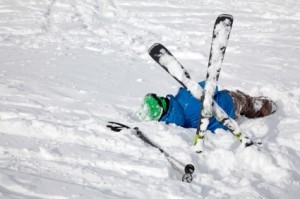Regardless of who is legally responsible for causing your ski or snowboard accident injury, if you have been injured at a ski resort then you must notify the ski area operator of the injury by registered or certified mail within 180 days of discovering your injury. Failure to notify the ski resort within a time designated by Oregon law bars a claim for injury or wrongful death. However, there are a few exceptions to this rule:
- If a ski operator had knowledge of the injury or death within 180 days of its occurrence, then failure of the injured party to provide notice will not bar the claim;
- If there is good cause for the failure to give notice, then the claim will not be barred; and
- If the ski resort operator failed to inform the skier or snowboarder of these notice procedures, then the claim will not be barred if it is submitted after 180 days.
 After proper notice has been given to the ski area operator where the injury occurred, Oregon law requires that the injured party or his/her representative either settles the claim or files a lawsuit within two years of the date of injury. As with all personal injury claims in the state of Oregon, there is a two-year statute of limitations on these types of cases: if you snooze, then you lose your ability to recover damages for your ski or snowboard injury.
After proper notice has been given to the ski area operator where the injury occurred, Oregon law requires that the injured party or his/her representative either settles the claim or files a lawsuit within two years of the date of injury. As with all personal injury claims in the state of Oregon, there is a two-year statute of limitations on these types of cases: if you snooze, then you lose your ability to recover damages for your ski or snowboard injury.
There are several exceptions to this general statute of limitations rule. First, claims brought on behalf of minor children and mentally disabled individuals have a longer statute of limitations because these classes of individuals are protected. Second, if someone injured in a ski resort accident dies before two years have elapsed after the time of their injury, then an action may be commenced by that injured party’s representative within one year of that person’s death.
Oregon case law provides examples of scenarios that do not fit within skiing’s “inherent risk” as defined by Oregon’s Legislature as well as other examples that fit squarely within the definition. For example, assume you are riding a ski lift when it breaks, sending you crashing to the ground. You are severely injured in this accident and later you learn that the ski lift had not been regularly maintained in the months preceding your accident. The ski area operator in this scenario is negligent and you have a good claim: falling off of an unmaintained lift is not an inherent risk of skiing even if riding a lift is.
The bottom line in ski resort accident and personal injury cases is that they are fact-specific and that it is difficult to prove a third party’s fault since skiers and snowboarders assume certain risks when they decide to hit the slopes. That said, if you or a loved one has been injured in a ski resort accident and you believe that the negligence of another skier or the ski resort itself is primarily responsible for your injuries, then contact an experienced personal injury attorney immediately. The personal injury attorneys at Dwyer Williams Cherkoss PC can evaluate your ski resort injury case and advocate on your behalf with adverse parties and insurers.

